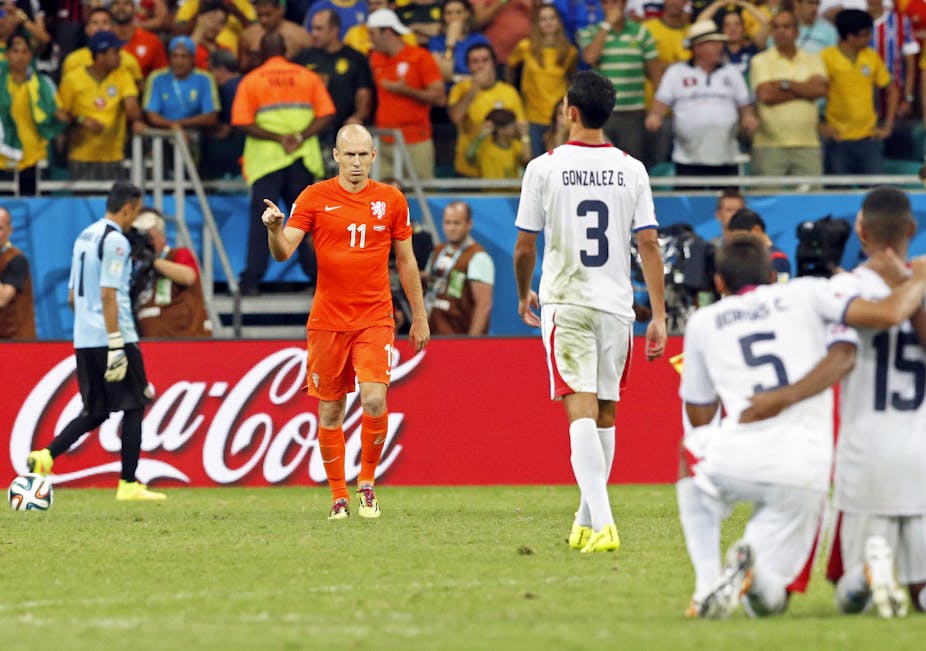On Saturday night, just hours before the latest quarter-finals of the World Cup, viewers watching SBS World News were exposed to over two and a half minutes of marketing for Coca-Cola. And that’s not even counting the ad breaks or the billboards shown during the highlights of the football.
As part of the news bulletin, SBS featured a segment about two Brazilian boys from the favelas of Rio de Janeiro. These boys described their desire to go watch a live World Cup football game. While the two kids seemed sad to be missing out on the fervour of the football stadiums, the news reporter explained that Coca-Cola had generously offered two free tickets for these boys to “fulfil their dream” of going to watch a World Cup match.
As the reporter handed the excited boys their free tickets, Coca-Cola’s logo was highly visible.
While the news segment focused on the poverty of the favelas, and the contrasting excitement of the football stadium, there were several subtle reminders of the corporate sponsor throughout. One of the boys has a Coca-Cola can in his hands on his drive to the game. In the stadium, one of the boys wore a wristband with the Coca-Cola logo.
Finally, when the children emerged from the stadium, they had large-size soft drinks in their hands.
Corporate philanthropy
This sort of philanthropy from Coca-Cola falls under what companies like to refer to as corporate social responsibility. And Coca-Cola is very good at it.
The “news story” appears to be designed by Coca-Cola’s marketers to have a double impact. It provides an opportunity for Coca-Cola to promote their brand to the kids and their families in the favelas. And it also helps promote Coca-Cola’s reputation as a good corporate citizen to Australians watching SBS, as well as investors that might read about it in Coca-Cola’s annual Corporate Social Responsibility report.
However, multiple issues arise from this TV report. Firstly, the decision by SBS to include such overt corporate marketing as part of a news segment is somewhat concerning. Secondly, it exposes the wide variety of marketing practices used by the food industry. And finally, it provides an opportunity to reflect on the true “corporate social responsibility” of Coca-Cola.
Unhealthy food marketing
Unhealthy diets are the biggest contributor to disease and illness in Australia – even more than smoking. Specifically, consumption of soft drinks has been associated with increased risks of diabetes, obesity and other major health problems.
In Brazil, obesity is also a major problem, and soft drink consumption is rapidly rising. While Coke may be fulfilling the dreams of the two boys in the report, the high consumption of soft drinks is contributing to future nightmares for the Brazilian health system.
Globally, Coca-Cola, along with many other multinational food companies, has recognised the public health need to reduce the marketing of unhealthy food to children.
Coca-Cola and other companies have pledged to practise responsible marketing of their products. This includes promises that they will not directly target children younger than 12 in their marketing messages, or show children drinking any of their products outside the presence of a parent or caregiver. But it would appear as though targeting children in favelas with gifts and soft drinks does not fall under these restrictions.
This follows previous reports in Australia that have demonstrated the failure of industry self-regulation to protect children from unhealthy food marketing.
The ‘junk food World Cup’

Coca-Cola’s donation of free tickets to the children in the favela, and the associated publicity from SBS, is only a tiny fraction of its marketing activity associated with the 2014 World Cup, in which it is a “FIFA Partner” sponsor.
Because of the high visibility and physical presence of unhealthy food at the World Cup, some have described the food company sponsorship (including from Coca-Cola and McDonald’s) as a direct attack on efforts to improve child health in Latin America.
Major sponsorship of global sporting events by large food companies is not new. Some public health advocates dubbed the 2012 Olympics in London as “The Obesity Games” in recognition of the huge amount of food industry sponsorship.
Another page in the corporate playbook
Coca-Cola’s donation of free tickets to the children in the favela is consistent with other practices used by food companies to boost their reputations. This includes setting up children’s charities, or sponsoring education programs. It mirrors tactics used by the tobacco industry.
Amid some pressure for governments to increase marketing restrictions, these practices, combined with all the other efforts of these companies to influence public policy in their favour, may ultimately serve to reduce the likelihood of new regulations.
While some – but not all – aspects of these types of activities are praiseworthy, we shouldn’t lose sight of the fact that their primary objective is to boost company profits.

